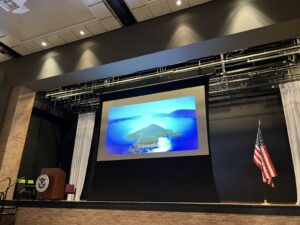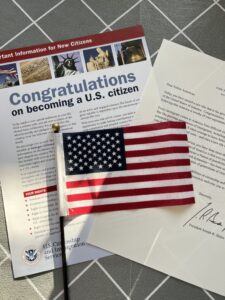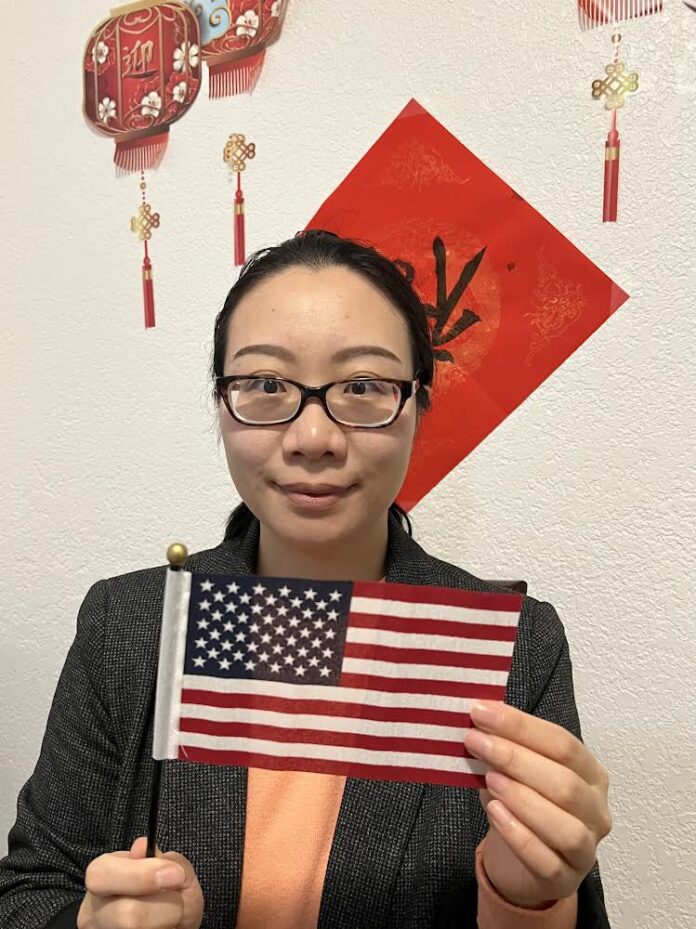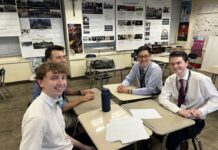For the past few years, Mrs. Ying Lu has been an integral member of the Jesuit community. Currently, Mrs. Lu teaches Mandarin and serves as a moderator of the Chinese Club. On January 29, 2023, she successfully completed her process of becoming a US citizen. Recently, I had the opportunity to interview Ms. Lu about her path to citizenship.
How was your living experience as a teacher in China? When did you move to the United States?
I was born in Beijing, China. In China, I was a university professor fluent in English. The reason is that I worked with many American students who were taking study abroad programs in Beijing. Through my teaching experience and acquaintances with American college students, I began to learn more about American culture and people. In addition, through teaching, I met my husband.
In December 2013, my husband and I decided to move to the US and start a family here. By having a family here, we knew that our children would have a better upbringing and education. So, the idea of establishing a family and ensuring a better future for our children was our primary motivation.

What motivated you to consider applying for US citizenship?
In 2013, I immigrated to the United States and eventually received my green card. Upon immigration, I really had not thought a lot about becoming an American citizen. I did not see the distinction between citizenship and residency. However, after some time, I started to understand the importance of citizenship. I started to learn more about the voting process and recent political trends and changes. Specifically, I began to understand the dire necessity of citizenship, especially after recent elections and the COVID-19 pandemic. Despite these challenges, I know that I can make my voice heard as a single person. So, I not only wanted to work and live here, but also wanted to exercise my political rights fully as a citizen.

Can you describe the steps of your naturalization process? What challenges did you face during this time?
During my visa’s time, I wanted to start my naturalization earlier. At that time, the application for citizenship was not an easy and smooth process. Beginning in 2011, I had to wait two years to get my US visa. After two years of waiting and immigration to the US, I could not work until I received a working allowance. Then, I had to wait a year to receive my working allowance and green card. In general, the whole process was extremely difficult and rigid.
After receiving my green card, the naturalization process is no longer difficult. So, I applied for citizenship last October and underwent an interview in December. Compared with the former process, I believe that the upgraded process that I went through was quite efficient. Also, I did not hire anyone to help with my application. So, I had to complete all the forms and prepare appropriate documents by myself.
What helped you the most in your preparation for the December interview and naturalization process?
Throughout the process, I had to spend time learning about the requirements for citizenship. For instance, I had to learn American history and politics. Through my learning, I actually found it helpful to know some factoids, which helped me during the interview process.

The thing that I benefited from the most was internet research. In preparation for the interview, I searched for good samples of interview questions. Also, I downloaded an app designed to help me compose well-thought and organized responses to certain questions regarding history, civics, law, etc.
What skills did you apply during your interview process?
For me, the interview process was not that difficult. I think that my teaching experience has really helped me navigate through the process. In addition, my linguistic skills and expertise in Mandarin Chinese was extremely beneficial. For instance, having a conversation with students helps me converse concisely and eloquently with those who interview me.
After hearing news of your successful application to US citizenship, what was your state of mind at the time?
My first feeling was excitement that I can vote and fully participate as an American citizen. Also, my excitement extended to the fact that I can now travel freely. For instance, if my family wanted to travel, I could travel with my family without having to go through any strict regulations. Currently, as an American citizen, I am not confined to limitations, like the ones I experienced under the visa.

What were some of your memorable experiences from the naturalization process?
One of my memorable experiences was the naturalization ceremony. The number of people at my citizenship ceremony was quite immense. The ceremony is actually divided into different rooms. My room was with an officer (host) and 500 other people. At the ceremony, the officer called every single country of every person in the room. When a country is called, the people from that country stand up and acknowledge it. Personally, I believe that this was interesting because I was with so many people with various backgrounds. For instance, there were people from China, Taiwan, Russia, Ukraine, Iraq, and more.

Another interesting thing also occurred in the ceremony. During the ceremony, the officer called a man in the front and asked him for his name. After the man read his name, the officer replied that the man’s name is now an American name. Then, the officer said that the man does not have to change his name because it shall be welcomed here in the United States. In my opinion, this officer’s response amazed me because it relates to this idea of American tolerance.
America’s tolerance allows all of us to maintain our cultural identity and practice our religions and rights freely. Personally, I believe that the United States is a country that attracts many people who want to pursue their dreams and objectives, such as building a family to ensure future generations’ access to better opportunities and education. But, this does not mean that we should forget our origins and everything we have. Actually, we bring our cultures and ways of life to America and allow more people to know about them.
Do you have any dreams or objectives that you would like to accomplish?
Like I mentioned earlier, I want to introduce more from my mother country to America, especially to students here at Jesuit. Even though I already started doing this through meeting American college students in Beijing, I feel different now as a US citizen. Particularly, I not only want to teach the Mandarin language through assignments and exams, but also introduce and share in-depth understanding and my personal experience with students.







